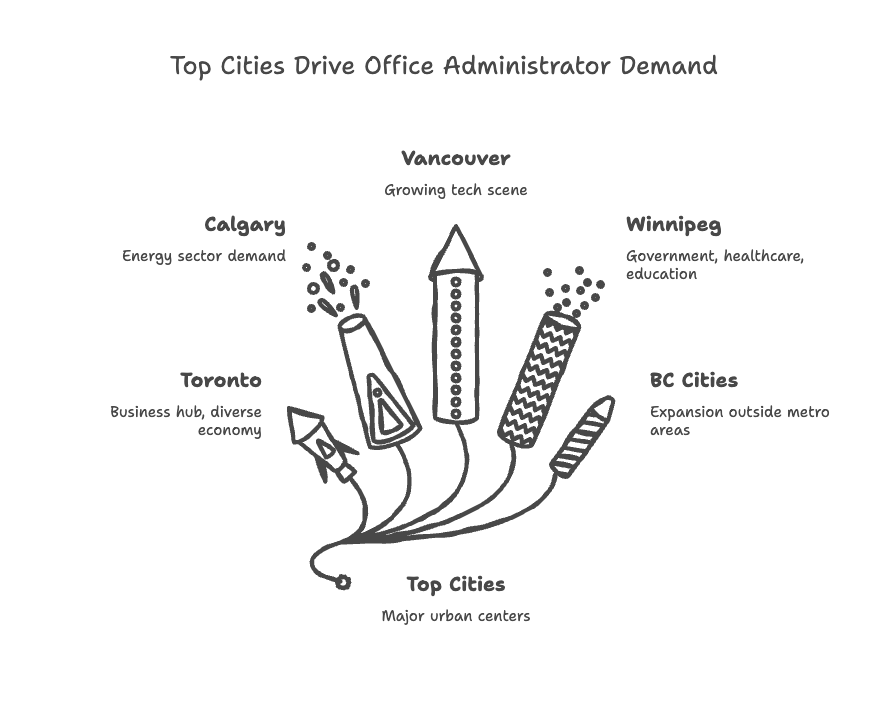What Does an Office Administrator Do?
Office administrators serve as the organizational backbone of businesses across Canada. But what exactly fills their day? These professionals juggle multiple responsibilities that keep operations running smoothly, from managing correspondence to coordinating team activities.
Core Job Responsibilities
An office administrator handles a diverse range of tasks that vary based on the organization's size and industry. The position requires someone who can maintain filing systems while simultaneously answering phone inquiries and scheduling appointments.
Primary duties include:
- Answer incoming telephone calls and respond to inquiries from customers and staff
- Maintain comprehensive filing systems and ensure accurate record keeping
- Manage correspondence including email, letters, and internal communication
- Coordinate schedules, meetings, and logistics for team members
- Perform inventory management and order office supplies
- Prepare reports, documents, and presentations as required
- Provide administrative support to managers and executives
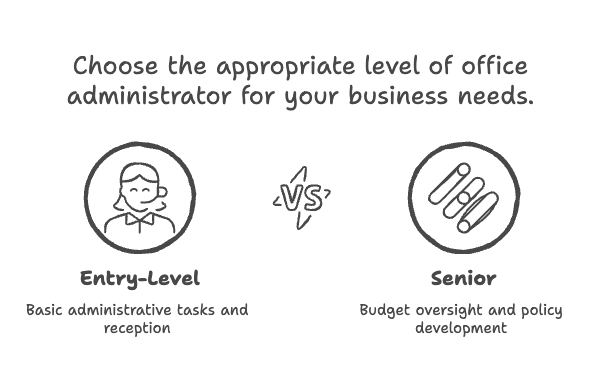
Entry-Level vs Senior Office Administrator Tasks
| Level | Typical Responsibilities | Decision-Making Authority | Salary Range |
|---|---|---|---|
| Entry-Level | Reception duties, basic filing, data entry, answer phones | Limited - follows established procedures | $35,000 - $45,000 |
| Intermediate | Project coordination, training new staff, managing supplies | Moderate - can establish some procedures | $45,000 - $58,000 |
| Senior | Budget oversight, policy development, supervising team | High - determines workflows and systems | $58,000 - $75,000+ |
• Your resume analyzed for free, opportunities delivered
Support Across Different Business Environments
The role adapts significantly depending on the industry. A dental office administrator manages patient records and insurance claims while coordinating appointment schedules. In engineering firms, administrators support project teams by organizing technical documentation and facilitating communication between departments.
Corporate environments require administrators to demonstrate strong business acumen, often involving them in financial tasks like expense tracking and invoice processing. Non-profit organizations rely on these professionals to balance administrative duties with community outreach coordination, requiring flexibility and interpersonal skills.
Essential Skills Required for Office Administrators
What separates an adequate administrator from an exceptional one? The combination of technical proficiency and people skills creates the foundation for success in this career.
Technical and Organizational Abilities
Modern office administrators must navigate various computer systems with confidence. They create spreadsheets, manage databases, and utilize specialized software depending on their industry. Organizational skills prove critical when maintaining multiple filing systems—both digital and manual—while ensuring nothing falls through the cracks.
Indispensable hard skills:
- Proficiency in Microsoft Office Suite and office management software
- Record keeping and data entry accuracy
- Document preparation and formatting expertise
- Financial administration including basic accounting procedures
- Inventory control and supply chain coordination
- Time management and scheduling capabilities
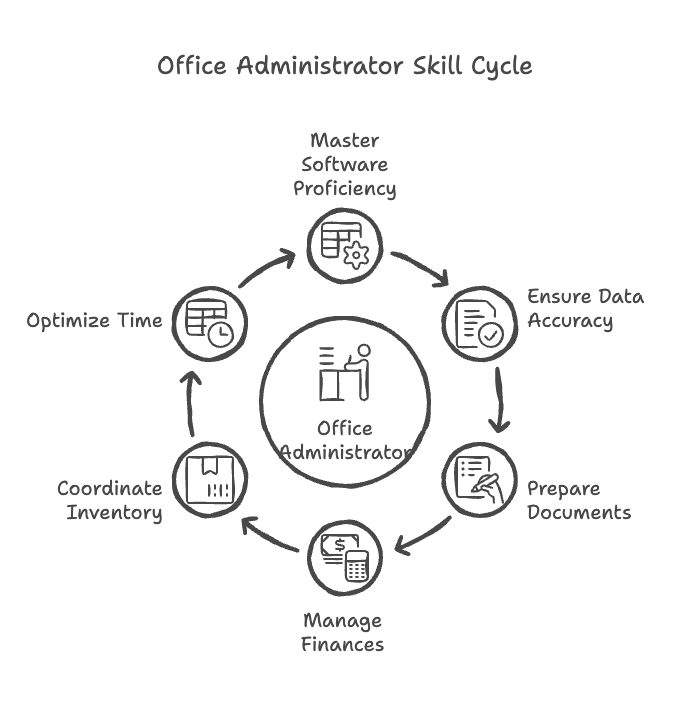
Interpersonal and Communication Skills
Can you balance professionalism with approachability? Office administrators serve as the first point of contact for many people, making communication skills paramount. They provide customer service, mediate inquiries, and facilitate team collaboration daily.
Strong telephone etiquette remains essential despite digital communication growth. These professionals must demonstrate active listening, clear articulation, and patience when addressing diverse inquiries. Written communication requires equal attention—correspondence must be professional, concise, and error-free.
Flexibility and Problem-Solving
The variety of tasks encountered requires adaptability. One moment might involve organizing a corporate event, the next could demand troubleshooting a scheduling conflict. Some positions require shift work or coverage during peak periods, demanding professionals who maintain quality despite changing circumstances.
Problem-solving abilities determine how effectively administrators respond to unexpected situations. When systems fail or urgent requests arise, they must determine appropriate solutions quickly while keeping operations functional.
Qualifications and Education Requirements
Minimum Educational Background
Most office administrator positions require a high school diploma at minimum, though many employers prefer candidates with post-secondary education. A diploma in office administration, business administration, or a related field demonstrates commitment to the profession and provides foundational knowledge.
Specialized certifications enhance employment prospects. Programs focusing on medical office administration, legal administrative procedures, or accounting principles prepare candidates for niche roles. Training in project management or human resources can open doors to advancement opportunities.
Professional Training and Development
The administrative field offers continuous learning opportunities. Professional development workshops cover emerging software, communication techniques, and organizational strategies. Many administrators pursue additional training throughout their careers to remain competitive.
Growth in this career often stems from expanding skill sets. Learning advanced Excel functions, mastering new project management tools, or developing expertise in specific industry software increases value to employers. Some professionals pursue certifications like the Certified Administrative Professional (CAP) designation to validate their expertise.
Office Administrator Salary and Compensation
Pay Ranges Across Canada
Compensation for office administrators varies significantly based on experience, location, and industry. Understanding salary expectations helps candidates negotiate fair compensation and plan career progression.
Average Office Administrator Salary by City
| City | Entry-Level Annual Salary | Mid-Level Annual Salary | Senior-Level Annual Salary | Cost of Living Factor |
|---|---|---|---|---|
| Toronto, ON | $38,000 - $46,000 | $48,000 - $60,000 | $62,000 - $78,000 | High |
| Calgary, AB | $40,000 - $48,000 | $50,000 - $62,000 | $64,000 - $80,000 | Moderate-High |
| Vancouver, BC | $37,000 - $45,000 | $47,000 - $58,000 | $60,000 - $75,000 | High |
| Winnipeg, MB | $35,000 - $42,000 | $44,000 - $54,000 | $56,000 - $70,000 | Moderate |
| Edmonton, AB | $38,000 - $46,000 | $48,000 - $59,000 | $61,000 - $76,000 | Moderate |
Benefits and Rewards Packages
Competitive employers offer comprehensive benefits beyond base pay. Health insurance, dental coverage, and life insurance form standard packages. Many organizations provide retirement savings programs, helping employees build long-term financial security.
Additional rewards enhance work-life balance. Flexibility in scheduling, remote work options, and generous vacation time attract quality candidates. Some companies offer professional development funding, allowing administrators to pursue training and certifications at reduced or no personal cost.
Career Paths and Professional Growth
Advancement Opportunities
Where does an entry-level position lead? Office administrators often progress to office manager roles, assuming greater responsibility for team coordination and budget oversight. Some transition into executive assistant positions, supporting senior leadership and participating in strategic planning.
Career trajectories frequently involve increasing specialization. Administrators might focus on specific functions like human resources coordination, accounting administration, or project management. These focused paths typically command higher salaries and offer distinct professional identities.
Specialized Administrator Roles
The administrative profession encompasses numerous specialized positions, each requiring unique skills and offering different compensation levels.
Specialized Office Administrator Roles: Requirements & Pay
| Role | Key Requirements | Industry Focus | Average Annual Salary | Growth Potential |
|---|---|---|---|---|
| Dental Office Administrator | Medical terminology, patient management software | Healthcare | $42,000 - $56,000 | Moderate |
| HR Office Administrator | Employment law knowledge, recruitment experience | Corporate/All | $48,000 - $65,000 | High |
| Accounting Office Administrator | Bookkeeping skills, financial software proficiency | Finance/Accounting | $45,000 - $62,000 | Moderate-High |
| Legal Administrative Assistant | Legal procedures, confidentiality protocols | Law | $46,000 - $64,000 | Moderate |
| Executive Assistant | Strategic thinking, high-level communication | Corporate | $55,000 - $82,000 | High |
| Logistics Coordinator | Supply chain understanding, coordination skills | Manufacturing/Retail | $44,000 - $60,000 | Moderate |
How to Apply for Office Administrator Positions
Preparing Your Application
A strong application begins with a tailored resume highlighting relevant experience and skills. Demonstrate organizational abilities through clear formatting and concise language. Include specific examples of how you've maintained systems, managed schedules, or improved office procedures.
Your cover letter should establish why you're suited for administrative work. Reference specific job requirements and explain how your background addresses them. Hiring managers appreciate candidates who've researched the organization and can articulate how their skills align with company needs.
The Hiring Process
Understanding typical recruitment stages helps candidates prepare effectively. Initial screening often involves reviewing applications for minimum qualifications. Shortlisted candidates typically face phone interviews assessing communication skills and basic fit.
In-person interviews delve deeper into experience and problem-solving abilities. Expect questions about handling multiple priorities, managing difficult situations, and using specific software. Some employers include skills tests evaluating typing speed, software proficiency, or attention to detail.
Interview Do's and Don'ts:
- Do provide specific examples from previous roles demonstrating key skills
- Do ask thoughtful questions about office culture and team dynamics
- Do arrive early and dress professionally for the interview
- Don't speak negatively about previous employers or colleagues
- Don't focus solely on salary and benefits during initial conversations
- Don't underestimate the importance of follow-up thank-you messages
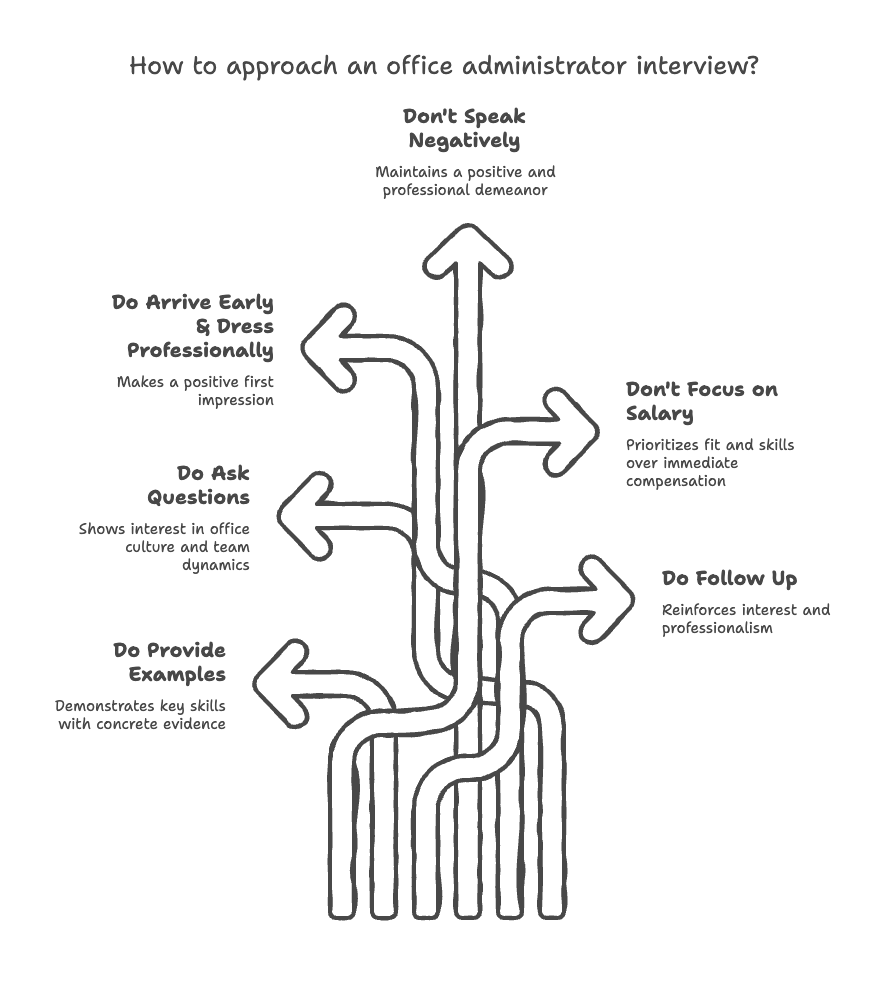
Work Environment and Daily Life
Typical Schedule and Time Management
Most office administrator positions involve full-time schedules, typically Monday through Friday during business hours. However, some organizations require shift coverage or occasional overtime during busy periods. The role demands effective time management as priorities shift throughout the day.
Balancing routine tasks with project work challenges even experienced administrators. Regular duties like answering phones and processing mail continue while special projects—organizing events, implementing new systems, or preparing comprehensive reports—require dedicated attention. Successful administrators develop strategies for managing competing demands without compromising quality.
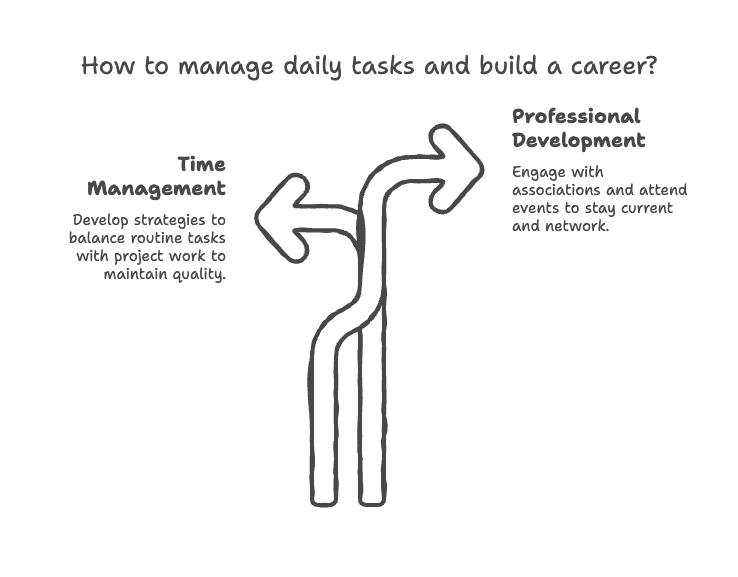
Building a Career in Office Administration
The community of administrative professionals offers valuable support and networking opportunities. Professional associations provide resources for skill development, industry insights, and career advancement strategies. Engaging with fellow administrators through formal organizations or informal networks enriches professional growth.
Attending workshops, webinars, and conferences keeps administrators current on best practices and emerging trends. These events offer chances to learn from experienced professionals, discover innovative tools, and build relationships that may lead to future opportunities. Ongoing professional development ensures administrators remain valuable assets to their organizations.
Top Cities Hiring Office Administrators
Opportunities in Major Urban Centers
Toronto leads Canada in office administrator job openings, reflecting its status as the country's business hub. The city's diverse economy creates positions across industries from financial services to technology startups. Calgary's energy sector drives demand for administrators with technical knowledge, while Vancouver's growing tech scene seeks candidates comfortable in fast-paced environments.
Winnipeg offers opportunities in government, healthcare, and education sectors, often providing stable employment with strong benefits. British Columbia cities beyond Vancouver—including Surrey, Victoria, and Kelowna—demonstrate growing demand as businesses expand outside major metropolitan areas.
Employment trends show consistent need for administrative professionals. While automation handles some routine tasks, the human elements of coordination, communication, and problem-solving remain irreplaceable. Organizations continue hiring administrators who combine technical proficiency with strong interpersonal abilities.
Regional Differences in Job Requirements
Provincial variations affect position requirements and compensation. Alberta positions often command higher salaries but may require flexibility regarding shift work in industries like energy and healthcare. Ontario roles frequently emphasize bilingual capabilities, particularly for government and corporate positions serving diverse populations.
British Columbia employers increasingly value environmental awareness and sustainability practices as organizational priorities shift. Manitoba positions may emphasize community engagement, especially within non-profit and public sector organizations. Understanding regional expectations helps candidates target applications effectively and set realistic salary expectations considering local cost of living.
The administrative profession continues evolving, but core principles remain constant: organization, communication, and dedication to supporting business operations. Whether starting an entry-level position or advancing to senior roles, office administrators play essential parts in organizational success across every Canadian province and industry.
